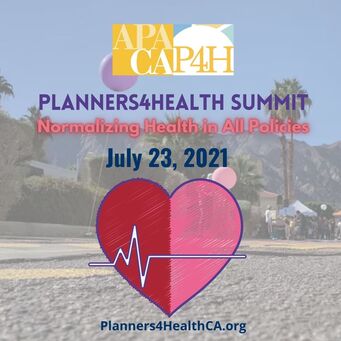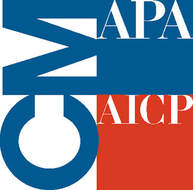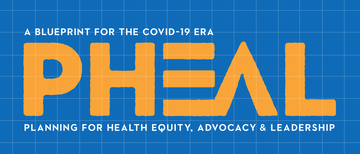NORMALIZING HEALTH IN ALL POLICIES
July 23, 2021
|
The Planners4Health Virtual Summit is the annual event where planning and public health practitioners connect, network, learn and discuss issues impacting community health across California. The leadership of California’s planners is the main driver of this inclusive event organized under the auspices of the American Planning Association California Chapter and in collaboration with public agencies, private firms, professional organizations, academia and community based organizations. As we emerge from the COVID-19 pandemic, the summit will focus on the role of “health in all policies” on climate resilience, housing and displacement, community safety and community organizing.
Thank you to everyone who attended the summit. The recordings are available below to anyone who did not make it. Our deep appreciation goes to all the speakers, organizers, supporting organizations and the behind the scenes volunteers. |
PROGRAM
9:00 am PDT
11:00 pm CDT/ 12:00 pm EDT
Welcoming Remarks
Diana Benitez, MURP
Chair
Planners4Health California
11:00 pm CDT/ 12:00 pm EDT
Welcoming Remarks
Diana Benitez, MURP
Chair
Planners4Health California
|
9:10 am PDT
11:10 pm CDT/ 12:10 pm EDT Keynote José Ramón Fernández-Peña, MD, MPA (he/him) President American Public Health Association |
|
9:30 am PDT
11:30 pm CDT/ 12:30 pm EDT
11:30 pm CDT/ 12:30 pm EDT
|
Communities across California continue to experience and prepare for the devastating impacts of climate change, such as increasingly frequent and damaging wildfires, abrupt and severe rain events, or worsening health impacts due to increasing extreme heat days. Extreme Heat is the leading weather-related cause of death in the United States, accounting for at least 600 deaths per year. [1] As temperatures continue to rise, the number of illnesses and fatalities are expected to increase. It is important for cities and counties to start taking actions as soon as possible to ensure the wellbeing and health of residents. To eliminate disparities, cities must prioritize advancing equity and justice in disadvantaged communities. This panel’s discussion will center on climate change and learning about recent equitable resilience efforts to mitigate its impacts.
Learning Objectives:
Facilitator: Natalie Hernandez- Climate Resolve- Urban Cooling Project Panelists:
|
|
10:30 am PDT
12:30 pm CDT/ 1:30 pm EDT
Break
12:30 pm CDT/ 1:30 pm EDT
Break
10:45 am PDT
12:45 pm CDT/ 1:45 pm EDT
12:45 pm CDT/ 1:45 pm EDT
|
Housing is a human right and a public health issue. During the pandemic many (8.5% unemployment rate) people lost jobs and their access to shelter has been put at risk. Recent studies show that Blacks and Latinos are the most at risk of eviction. And for more than a year, we have seen how COVID has increasingly impacted the health of working class communities and people of color. The state is currently under an eviction moratorium, and continues to promote Affirmatively Furthering Fair Housing (AFFH) policies. People are nervous about the back rent (national average is more than $6,100) they will owe once the moratorium ends and AFFH policies don’t protect all populations from being denied housing. Communities across that state have need stronger tenant protections. How do we keep people housed?
This panel discussion will focus on what city staff and advocates have been developing in the last year to protect tenants from displacement in the Bay Area. In the last year, three Bay Area Cities have developed policies, plans and investments to provide much needed tenant protections which include Fair Chance Housing policies in Oakland and Berkeley that prohibit the blanket discrimination of rental applicants based on criminal histories, the San Jose Affordable Housing Implementation Plan that strengthens tenant protections and the Community Stabilization and Opportunity Pathways Fund with unique community-led fund governance model that provides the City of San Jose with $154.8 million in initial funding. Learning objectives will include:
Facilitator: Tina Yuen, Senior Planner at Changelab Solutions Presenters:
|
|
11:45 am PDT
1:45 pm CDT/ 2:45 pm EDT
Lunch
1:45 pm CDT/ 2:45 pm EDT
Lunch
12:30 pm PDT
2:30 pm CDT/ 3:30 pm EDT
2:30 pm CDT/ 3:30 pm EDT
|
Health Leadership: A Conversation with Michael Osur, Riverside County's Healthy Communities Visionary
|
|
Join in for a lively conversation with award-wining Michael Osur, the "architect of the healthy communities movement in Riverside County." Mr. Osur will reflect upon his transformative journey seeking to improve health outcomes through community design.
1:00 pm
3:00 pm CDT/ 4:00 pm EDT
Hallway Chat
3:00 pm CDT/ 4:00 pm EDT
Hallway Chat
1:15 pm
3:15 pm CDT/ 4:15 pm EDT
3:15 pm CDT/ 4:15 pm EDT
|
Traffic-related fatalities and serious injuries have long been regarded as a public health issue, and now it is becoming clear that traffic enforcement is as well. Police officers in the United States pull over more than 19 million vehicles annually, making vehicle stops the number one reason for contact between citizens and the police. Multiple studies have demonstrated that Black drivers are stopped disproportionately, a gap that cannot be accounted for by factors such as differential driving behavior or greater poverty.[1] The inequitable impacts on people of color mean that police traffic enforcement itself poses a danger to these communities. This panel’s discussion will center on reconsidering the traditional role of the police in traffic enforcement and learning about recent efforts to reimagine community safety.
Learning objectives will include:
Facilitator:
Presenters:
|
|
2:15 pm
4:15 pm CDT/ 5:15 pm EDT
Break
4:15 pm CDT/ 5:15 pm EDT
Break
2:30 pm
4:30 pm CDT/ 5:30 pm EDT
4:30 pm CDT/ 5:30 pm EDT
|
According to the New York Times, ”at the onset of the coronavirus pandemic, agricultural workers were deemed “essential” by the Trump administration.” What this meant was that they were exempt from the stay home orders resulting in the possibility of contracting the virus. In fact, according to the Public Health Alliance of Southern California, farmworkers in the eastern Coachella Valley have been some of the hardest impacted community members throughout COVID-19 pandemic. This session will bring members of the Riverside University Health System-Public Health COVID-19 Task Force to share how farmworkers have been prioritized for testing and vaccinations efforts. The panel will discuss the role of data for decision-making; emergency preparedness and response; community organizing, outreach and engagement; empathy and humility as traits of leadership; collaboration and how to use their response approach to address other chronic crises threatening the well-being of the heart and soul of our food supply chain: the farmworkers.
Learning Objectives:
Facilitator:
Presenters:
|
|
3:30 pm PDT
5:30 pm CDT/ 6:30 pm EDT
Adjourn
5:30 pm CDT/ 6:30 pm EDT
Adjourn
Supporting Organizations
Event's Disclaimer










